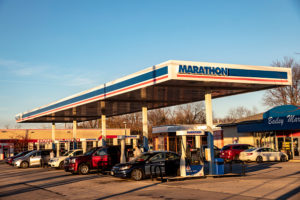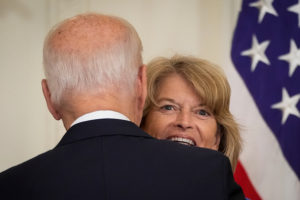Senate Primed to Pass Bipartisan Bill – But It’s Gonna Cost Us

Unity; it sounds nice, doesn’t it? Wouldn’t it be great if the people we send to represent us in Congress could just work together and get the job done? If you’ve ever engaged in such philosophical waxing, congratulations – your dreams may finally be coming true. The Senate voted 67-27 on July 7 to end debate on the $1.2 trillion bipartisan spending bill. Lawmakers will reconvene Sunday at noon and, if the amendment process goes quickly enough, this package could be headed to the House for approval by Monday. But there’s more to this infrastructure bill than just bridges and broadband. From breathalyzers and cameras in every car and a per-mile driving tax to the cryptocurrency clampdown and hundreds of billions in new debt, we the people will pay dearly – in both money and liberty.
Pay to Play (or Work)
One of the more controversial sections of this spending deal – and one that would easily plow past President Biden’s “red line” on tax hikes on anyone making less than $400,000 a year – is a per-mile fee for driving. Now, if you’re thinking that sounds familiar, it’s because we already have it – it’s the fuel tax, which hits much harder for those who drive more or who own less fuel-efficient vehicles.
Unless the language is changed in the final amendment process, this will begin as a pilot program. In the early phase, volunteers will have to opt-in to have their trips tracked by the federal government. As it stands now, things like how to keep the data safe or even whether the information can be sold to non-government entities simply haven’t been addressed. Should this eventually become mandatory nationwide, American car owners will pay sales tax on the purchase, an annual tax each year for the privilege of owning the ride, licensing fees both for the privilege of driving itself and for each registered rig, an effective per-mile use tax at the pump, and an actual per-mile fee to be billed at the end of the year. If nothing else, we better get some damn fine roads out of the deal.
Nanny State, Take the Wheel!
If you thought the ride stopped there, buckle up – you ain’t seen nothing yet. There’s a provision that would require auto manufacturers to include some sort of “drunk and impaired driving prevention technology” built into every vehicle produced within two to three years after the rule is issued. That’s right; get ready for the Nanny State to take the wheel! Kimberly Williams, CEO of the nation’s largest ignition interlock maker, Intoxalock, said, “Making roads safer is at our core of who we are at Intoxalock.” Perhaps that’s true, but don’t discount the influence of money. The $220,000 that Open Secrets shows the company spent in federal lobbying last year could certainly result in a wonderful return on investment, should the measure pass. “Drunk driving continues to be a leading cause of deaths,” she continued, “and ignition interlock devices, like ours, are an effective tool at preventing drunk driving occurrences.” The last bit sounds nice, but the facts don’t support it. According to the Journal of the American Medical Association, car accidents don’t even appear on the list of the top 12 causes of death for 2020. Suicide, which came in last on that list, claimed 44,834 lives – and that’s a good deal more than the 38,680 traffic-related deaths reported by the National Highway Traffic Safety Administration. The NHTSA also tells us that about one-third of those are caused by drunk drivers: So that’s a little less than 13,000. Not acceptable, sure – but still a far cry from being a “leading cause of deaths.”
The legislation calls for tech like a breathalyzer – which can be a problem for diabetics, those on the keto diet, or even people suffering from indigestion who have recently belched or vomited. According to some researchers and DUI attorneys, each of these can cause alcohol to be present on the breath, which could trip an ignition interlock even if the would-be driver hasn’t had so much as a sip. Other suggestions include eye scans to check focus – a potential problem for those with certain eye conditions – and even an infrared touch test on the ignition button. Thinking you can circumvent these easily enough? Think again. The provision also calls for a driver-facing camera that can detect if you try and have someone else start your car or even tell if you plan to fire it up sober and get drunk on the way.
None of the aforementioned issues are considered by the bill, of course, and neither is the implications of the state constantly monitoring drivers via in-car cameras or even something so simple as what to do should it start raining while you’re drinking at home, and you realize you left the windows down.
Financial Facepalm
It’s not all about cars, either. At least some of the additional funding required to pay for all the new regulations and the $550 billion in additional spending over last year’s budget will come from a clampdown on cryptocurrency. Tightening up on digital asset taxation, senators believe, will pay for about $28 billion of the increased spending, and one proposed amendment would even go so far as to play favorites with the type of crypto, exempting the tax on miners of “proof of work” systems while exempting those using “proof of stake” setups.
While those advocating this bill say that it pays for itself, the Congressional Budget Office has called BS. The CBO analyzed the proposal, as it does all spending packages, and explained that the math just doesn’t’ add up. Instead, it will increase federal budget deficits by $256 billion over the next decade – on top of making us pay more to have less freedom. Those in favor of the bill point to the $57 billion senators believe will be generated over the long term by the “economic growth benefits of the infrastructure projects” or the $53 billion in unused federal supplemental unemployment funds to be returned by the states. If both uncounted sources pan out, that’s certainly an improvement, national debt wise – but it’s still $146 billion shy of what the CBO says this bill misses.
At Least They’re Getting Along – For Now
But hey, surely Republicans and those libertarians who vote GOP just to keep the Democrats out will be fine with the total disregard for fiscal responsibility and freedom from government interference in their daily lives. After all, what could be more important than appearing to get along? Sen. Lisa Murkowski (R-AK) knows the important thing leading up to an election cycle is being seen as a team player, no matter what you must give up.
“I’m really worried that everybody believes that we’re as dysfunctional as we appear to be, and so to prove otherwise, it’s kind of important,” she explained. “The Senate needs some demonstrated acts of bipartisanship.” Well, some might say that if lawmakers can’t fund the government without adding billions in debt or locking down our liberty with more regulations, then they aren’t competent enough for the job. But at least senators can crow about their camaraderie as they hold hands across the aisle and sing Kumbaya – at least until the next partisan fight breaks out and everyone forgets all about the momentary peace.
So, hurrah for those who called for consensus: Victory seems all but assured. Here’s hoping they’re just as happy when the bill comes due.
The post Senate Primed to Pass Bipartisan Bill – But It’s Gonna Cost Us was first published by Liberty Nation, and is republished here with permission. Please support their efforts.





